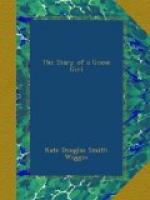Mr. Heaven is merged, like Mr. Jellyby, in the more shining qualities of his wife. A line of description is too long for him. Indeed, I can think of no single word brief enough, at least in English. The Latin “nil” will do, since no language is rich in words of less than three letters. He is nice, kind, bald, timid, thin, and so colourless that he can scarcely be discerned save in a strong light. When Mrs. Heaven goes out into the orchard in search of him, I can hardly help calling from my window, “Bear a trifle to the right, Mrs. Heaven—now to the left—just in front of you now—if you put out your hands you will touch him.”
Phoebe, aged seventeen, is the daughter of the house. She is virtuous, industrious, conscientious, and singularly destitute of physical charm. She is more than plain; she looks as if she had been planned without any definite purpose in view, made of the wrong materials, been badly put together, and never properly finished off; but “plain” after all is a relative word. Many a plain girl has been married for her beauty; and now and then a beauty, falling under a cold eye, has been thought plain.
Phoebe has her compensations, for she is beloved by, and reciprocates the passion of, the Woodmancote carrier, Woodmucket being the English manner of pronouncing the place of his abode. If he “carries” as energetically for the great public as he fetches for Phoebe, then he must be a rising and a prosperous man. He brings her daily, wild strawberries, cherries, birds’ nests, peacock feathers, sea-shells, green hazel-nuts, samples of hens’ food, or bouquets of wilted field flowers tied together tightly and held with a large, moist, loving hand. He has fine curly hair of sandy hue, which forms an aureole on his brow, and a reddish beard, which makes another inverted aureole to match, round his chin. One cannot look at him, especially when the sun shines through him, without thinking how lovely he would be if stuffed and set on wheels, with a little string to drag him about.




